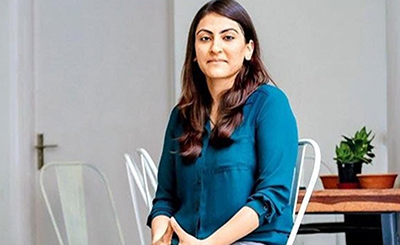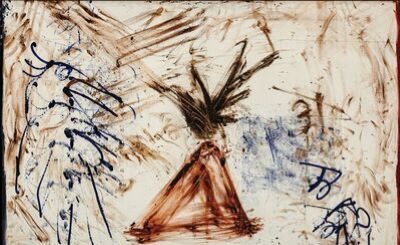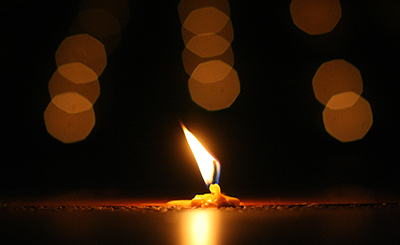
Everyone gets a nickname in their lifetime, Johnson Yoohannan told me that gloomy day. True. In Kombodinjalakkal, almost everyone had two names, or more. Postman Peter was ‘Cucumber’ and his brother Thomas, quite appropriately, ‘Doubt’. We called Punneli Anthony ‘No Touch’, and Raghavan, contractor of government jobs, was ‘The Trap’. For those who are not familiar with the workings of our village, this practice may appear unusual and uncalled for. But this was a blessing for most of us. Because Kombodinjalakkal had thirteen Thomases and 12 Georges and tens of Peters, Raghavans and Chandrans, all living in confused harmony. The happiest of us all was the postman. He loved the nicknames as they helped him sort letters faster. Everyone calls Johnson Yoohannan ‘The Magician’ now.
We were standing under the huge banyan tree that marked the southern end of Kombodinjalakkal. We were to go to the Old Cemetery, on my cycle, which Johnson had just borrowed from me. Soon the journey started. He furiously peddled the old bicycle. The road to the cemetery was rocky and dusty. The graves lay two miles away from where the banyan stood. Dilapidated and thorny, the final abode of the departed stood uphill, surrounded by unknown trees and adventurous clouds.
I must admit I was tad hesitant to share my vehicle with the Magician. But he scrounged on and I gave in. I was in fact scared. My grandfather had told me: one should never say no to a magician’s request. They do things to you, son. They could make you live with fiery ulcers the rest of your life. In your next life as well. He knew. He once turned his back on a magician who had asked for one of his chickens. He later developed inside his stomach ulcers that looked like weeping corals. Appappan died soon as his abdomen became a bin of all the unwanted and nameless things and beings.
My cycle yelped as Johnson peddled it. He crouched on it like an abandoned warrior from the stories my grandfather used to tell me. Magician, he called me. “I got a name the day I was born,” he continued, panting; turning back to me who was clasping to the carrier seat like a crab. I loved going on such short trips with him, riding pillion. He spoke about things, I felt, only I could relate to. “Yes, I know,” I shouted to him. “You were called The Yellow One earlier, before people started calling you The Magician.” Johnson guffawed. “Yes, because I looked very yellow in the first few weeks I was born in. Even now, in some mornings when I go to pray at my mother’s grave I look dirty yellow. Morning sun is a sick sun, I tell you. It has long hands and sharp teeth.”
“Everyone gets a nickname in their lifetime, sooner or later,” Johnson said again. “My mother, though, got one only after her death,” he paused. I knew his mother. Tandoori Teresa earned the name after she shoved her head into the country oven one summer morning and burnt herself up. When neighbours pulled her out, after she spent some time inside the stove, she looked like a giant roasted chicken. The soot and amber smeared on her skull appeared like yogurt and spices on a slice of Tandoori chicken. People have strange tastes when it comes to naming people. I won’t complain, though. I still don’t know — can’t figure out at all — why we call the tea stall owner One-and-a-Half-Ass. As far as I can see he always had a good pair of fully grown ass.
If one were to be factually and metaphorically accurate, we should have called him Half-Balled. My father told me this man had lost one of his testicles during the Emergency after policemen took him for interrogation. They had word that he was colluding with K Venu and PC Unnichekkan, two infamous Naxal rebel leaders, and wanted him to disclose their hideouts. One-and-a-Half-Ass never had a clue and obviously never gave a clue. So an experimenting policeman in the unit placed his testicles on a hot frying pan and slapped it with a flat spoon. His manhood broke by half and he lost one of the nuts. Still, we call him One-and-a-Half-Ass. Isn’t that strange?
Johnson got off the cycle slowly. From here, the hill goes steep high and not many can pedal all the way up. No mortal can do that, especially with someone on the carrier.
‘The Sigh’ did that, I said. He could do anything, my friend, Johnson said. He was no mere mortal. He lived with two ghosts and his job was to sing at the funerals of people who met with unnatural death. Everyone called him ‘The Sigh’, but my father preferred to call him Pokkan, a name his mother had given him. Pokkan was strong and spiritual. He worked without breaks and ate like the best of the wolves. But people said he always missed something and always started and ended a conversation with a sigh. Everyone knew he lived with the ghosts, but the ghosts thought it was a secret and when he broke the news to them one night, they left him, he told the villagers with, of course, a deep sigh. He left our village that night and never came back.
He left us the night after the morning my mother died, you remember, boy? I said I didn’t know. The day Teresa died, the village was expecting showers which had stayed away for months. The earth was hot and everyone was sweating. I saw my father coming home in a hurry and dashing into the loo. He puked with a loud noise, like a hungry cow, and told my mother the story of Teresa’s death. Everyone ran towards the Messiah Rock under which Magician Johnson Yoohannan, his mother Teresa and sister Rosy Ruth lived. The house had a thatched roof and bamboo gates on the front and back. Its walls wore green paint, while the interiors looked bright white.
Magicians love colours, Johnson once told me. The house carried within its womb many animals, birds and several other nameless creatures. Someone said someone once spotted a meerkat there. I have seen two big eagles whenever I visited Johnson. He was a successful magician then, unlike now. He was our hero because he could turn sand into stardust. Teresa never left her house. My grandfather knew her since her baby days. Poor girl, sick girl, he’d say. She is sick in head. She sees people that don’t exist. She hears voices that are hidden in the air. That’s why she always talks in laughter, Appappan said.
We reached the top of the hill and Johnson found a big, flat stone to sit on. He wasn’t panting now, but I was. How old are you, boy? He asked me. Twelve, I said. You should be jumping up and down like a wolf at this age. Look at me, I am 10 years older and I can climb two more hills in a matter of minutes. Magicians are capable of doing anything they deem fit, I knew. They can fly, walk on water and escape fire and arrows. My grandfather was sure they mediate between God and Satan. They have that power, to negotiate with the supernaturals. Johnson used to do that. I have seen him standing alone along the brook that marked the start of our village, talking to people we never saw in real life.
Teresa too did that quite often. The whole village knew it. She spoke to elfs, imps and little witches. “I hate big witches, they carry big brooms and look ugly on it,” she once told my mother. She spoke to snakes and hibiscuses. She loved talking to them. The whole village made fun of that, too, but no one told her so. No one talked about all these until the day she charred her own skull.
Do you know why my mother killed herself? Johnson asked me all of a sudden. I thought he was enjoying the view from the hill. The old cemetery looked forlorn and desolate. It always wore an unhappy ambience, and today was no exception either. I hated going there in spite of the fact that the hilltop where the cemetery stood offered an incredible view of my village, lying below in pristine serenity. From where I stood, I could see the tyre factory that many of the villagers did not want there. Smoke billowing up from its giant pipe went up into the sky like Tyrannosaurus rexes on hunt. High up, thick patterns of smoke competed with white and grey clouds in a curious rivalry. People who come to my village from the other side of the hill often mistake the smoke for small slices of rain clouds and run faster to reach shelter before it poured. The day Teresa died, smoke from her oven went up and filled the village with a fragrance many thought was coming from burning frankincense. Some thought it was going to rain. Some inhaled the air deeply to feel the fragrance. She filled almost all lungs in her neighbourhood, you know, Johnson told me, sitting on the rock.
Now he was holding a little red book, which I had not seen till then. Maybe he had kept it inside his underwear. That’s how men of his age kept books about nude men and women for private reading. But I never felt Johnson would want one at this spot. May be he wanted. People have strange tastes. Boy, I still remember the day you were born, as clear as the first film I watched inside Nadam Cinema. You were thin and small, like the spine of a pepper plant, and all dark and ugly. But you smiled beautifully, like a nun without her clothes. I knew he loved me a lot. Johnson likes you a lot, my father used to tell me. As if you were born inside their House of Bedlam, Ha Ha Ha.
Johnson showed me the book. Familiar? I nodded my head. I nodded even when I had no clue about the things I say. He understood me, though. Sit, I’ll tell you. But before we do that, I need you to help me climb up a tree and set up this magic rope. He pulled out a long rope that was glittering. At the end of it, I could see little figures of Mother Mary and Little Jesus and some others which were hanging like the earlobes of a hundred-year-old woman. I helped him move the rope up the big banyan tree that monopolised a bigger part of the huge cemetery. He quickly climbed down, dusted himself off and sat next to me. I noticed he had grey eyelids and pale cheeks. His hair looked the same — shiny brown and silky smooth.
I met ‘The Sigh’ some days ago, Johnson said. “My mother had sent him this diary a day before she left me. I have seen her scribble on the yellow pages of this many times, but never bothered to read.” Why did The Sigh leave the village after her death? I asked. “We’ll know sometime, dear,” Johnson replied. “Now, I want you to read the book to me. Loud and clear. Like you read The Bible for the Herd from the altar inside our church.” I was surprised. Did she actually send it to him the eve of her fateful tryst with the shiny interiors of the oven? I opened the diary and found a page that seemed to have been marked in red, and started reading like how I mouth those sorry dirges at the funerals I attend as an altar boy.
“My dear Jacob Pokkan. I will never call you ‘The Sigh’. I always called you Jacob and you never liked it. That was when my father was rich and you were poor and we were butterflies. You had suns in your eyes and I had a dream for you. I know you’d be angry for what happened between us. But I want you to read this note patiently and let me rest in peace.”
I paused and looked back. Johnson was standing just behind me looking at the sun, hungrily swimming towards the dusk. “Read on. Look towards the village down. And please read it aloud,” he said. I looked down at the village lying in a reverie. I felt like Jesus, giving the Sermon on the Mount. That thought sprang a smile on my face. I continued.
“All these years, after we parted ways, I have lived in a world where I saw no sun or stars. The days were bad bright and nights were cruel and dead. I missed you there, Jacob. Years and days went by, and I slowly started seeing light. Father said I married someone in between and I smiled at everything that smiled back at me — a ray of sun, the Son of God on a red calendar hanging on our blue wall, birds, and the hibiscus. The rest of the world said I was mad: I didn’t care. I saw things they said never were there. I saw Lucifer, I saw Gabriel and I saw the many faces of the moon, all melancholy and murmuring. Everyone told me I lost my nerves, and told me hibiscuses were red in colour and the moon never was purple. Each time they told me these ‘truths’, I lost a piece of myself. I shrank like a slug into its hole and wept like a waterfall gone mute. But I found a saviour in my boy, who had come to me in one of my darker days. He told me I was right and they were wrong. He loved me like you did. And when I told him the moon was purple, he made it look purple. When I told him the hibiscuses were yellow and blue, he smiled with me and got me yellow and blue hibiscuses. I saw them, felt them, and he made me look at them the way I wanted. He built a new world for me, and that world my only ‘rights’ were right, and nothing mattered. He brought me birds that sang like human, eagles that carried messages and cloaks that made me fly….”
I wanted to take a pause and think about what I had just read — most of which I couldn’t understand and sounded like the blabbering certain nuns in our parish were famous for. But I went on reading; there was something that hooked me to the letter.
“These days, something doesn’t see right. I woke up many times in my sleep and felt the world real and hurting. I saw bottles of coloured liquids and tablets that tasted like sour groundnuts. When my boy came and hugged me, I felt he was an alien. And yesterday, I heard people I never wanted to hear and heard them say I am getting better. I so wanted to see my boy and they said he’d be there soon. They were murmuring how he now didn’t have to learn more magic to keep me happy, to keep me happy in my world of things that don’t exist in theirs.”
“I feel my world is crumbling. Dear Jacob, I don’t want the world they build for me. I want my boy’s world back.”
I stopped reading. It was cloudy up there and the wind was blowing heavily. The sun looked hidden. I looked back and didn’t see Johnson around. “Boy, you know why mother killed herself?” I searched and found him on a long branch of the banyan tree. “She knew I was faking it all. But you know I never wanted her to know that. She was the only reason I learnt magic — to build a world only my mother could love and appreciate. Blue hibiscus, yellow rabbits, singing snakes and smiling potatoes. Magic made everything possible. I should never have given her those medicines they had given me.”
“But she never blamed you,” I shouted back at the tree. He smiled back and said, “Boy, I love you.” And jumped down like a kite on a freefall. The glittering rope had transformed into a noose, and for a moment I thought he was practising a rope trick. In a flash, he flew down and stood still in between, with the noose hugging his neck in a neat tight embrace. He choked as though he was in a devil’s embrace. His eyes popped while his body danced in a magically wild rhythm. I looked away for a while and then looked up. The sky was clear and the evening sun was shining merrily on him. His shadow, which fell on the rock where I sat, looked like crucified Christ. I wanted to be scared of something at this moment, but holding a little red diary, I felt there were things I should do. I slowly took my cycle and pedalled it idly. As I slid down the hill, all I could think of was how would my villagers name him now that he was hanging from a banyan tree…
I’d love to call him The Hanging One.
More from The Byword
Comments
*Comments will be moderated











